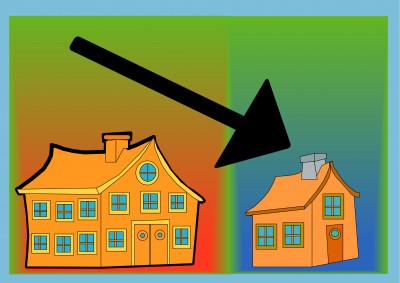Impact the Death Of a Spouse Has On Your Mortgage
The death of one partner in a marriage can have significant consequences for a mortgage. Exactly what effect it has will depend on whether it is a single or joint mortgage, what balance remains on the mortgage, and other debts and assets of the deceased.
 In the case of a couple having a joint mortgage, the death of one spouse will simply mean the other spouse becomes the sole mortgage-holder. As long as she can continue making the payments, the property will be unaffected. Federal law prohibits the lender from calling the entire mortgage due because one spouse has passed away.
In the case of a couple having a joint mortgage, the death of one spouse will simply mean the other spouse becomes the sole mortgage-holder. As long as she can continue making the payments, the property will be unaffected. Federal law prohibits the lender from calling the entire mortgage due because one spouse has passed away.
- If the mortgage is only in the name of the deceased and she had more assets than debts, then the state will pay off the mortgage as part of the probate process. The worst-case scenario is that the house may have to be sold to pay the mortgage off if there aren’t enough other assets to cover the outstanding amount. However, when there is no will and assets are distributed to heirs according to the intestacy laws of the state, the surviving spouse is always one of the first in line to receive the remainder of the deceased’s assets after debts, taxes, and funeral expenses are paid. If the mortgage can be paid off through other assets, in many cases, the spouse would receive the paid-off home as his share of the estate.
- If the surviving spouse sells the house within two years of the death, has not remarried prior to the sale, and meets required conditions, she has the right to exclude up to $500,000 of her profit from the transaction. For further information read US Government Publication 523.
- If the surviving and now sole-owner of the home realizes he is not going to be able to continue make mortgage payments for a long period of time, he may want to look into a reverse mortgage. A reverse mortgage is a loan for senior homeowners that uses a portion of the home’s equity as collateral. The loan generally does not have to be repaid until the last surviving homeowner permanently moves out of the property or passes away. At that time, the estate has approximately 6 months to repay the balance of the reverse mortgage or sell the home to pay off the balance.
Information provided by Chester County PA Realtor Scott Darling.
 Usually, when you take money out of an individual retirement account before you reach age 59 1/2, the IRS considers these premature distributions. In addition to owing any tax that might be due on the money, you'll face a 10 percent penalty charge on the amount. This is not the case, however, when you use the money to buy your first investment real estate. (Note: Technically, you don't have to be purchasing your very first home or building. You qualify under the tax rules as long as you, or your spouse, didn't own a principal residence at any time during the previous two years.) You can use up to $10,000 in IRA funds toward this purchase. If you're married, and you and your spouse are both first-time buyers, you can each pull from retirement accounts, giving you $20,000 to use.
Usually, when you take money out of an individual retirement account before you reach age 59 1/2, the IRS considers these premature distributions. In addition to owing any tax that might be due on the money, you'll face a 10 percent penalty charge on the amount. This is not the case, however, when you use the money to buy your first investment real estate. (Note: Technically, you don't have to be purchasing your very first home or building. You qualify under the tax rules as long as you, or your spouse, didn't own a principal residence at any time during the previous two years.) You can use up to $10,000 in IRA funds toward this purchase. If you're married, and you and your spouse are both first-time buyers, you can each pull from retirement accounts, giving you $20,000 to use. things that are always going to happen, death and taxes. On a not so morbid note, let’s look into a few
things that are always going to happen, death and taxes. On a not so morbid note, let’s look into a few  While many people focus on personal health goals in the New Year, the beginning of the year is also a great time to check your financial fitness. So how can you whip your finances into shape?
While many people focus on personal health goals in the New Year, the beginning of the year is also a great time to check your financial fitness. So how can you whip your finances into shape? Sellers arrogantly slap the highest price on their homes that they think they can get away with. Then they're surprised when the market slaps them right back with insultingly low offers or none at all.
Sellers arrogantly slap the highest price on their homes that they think they can get away with. Then they're surprised when the market slaps them right back with insultingly low offers or none at all. still out there for the taking, so get out there and start looking for your new home today! These low down payments are being offered by
still out there for the taking, so get out there and start looking for your new home today! These low down payments are being offered by  Here’s a summary of some thoughts from
Here’s a summary of some thoughts from  made with
made with  Increase your monthly mortgage payments
Increase your monthly mortgage payments Reasons not to downsize:
Reasons not to downsize: 



